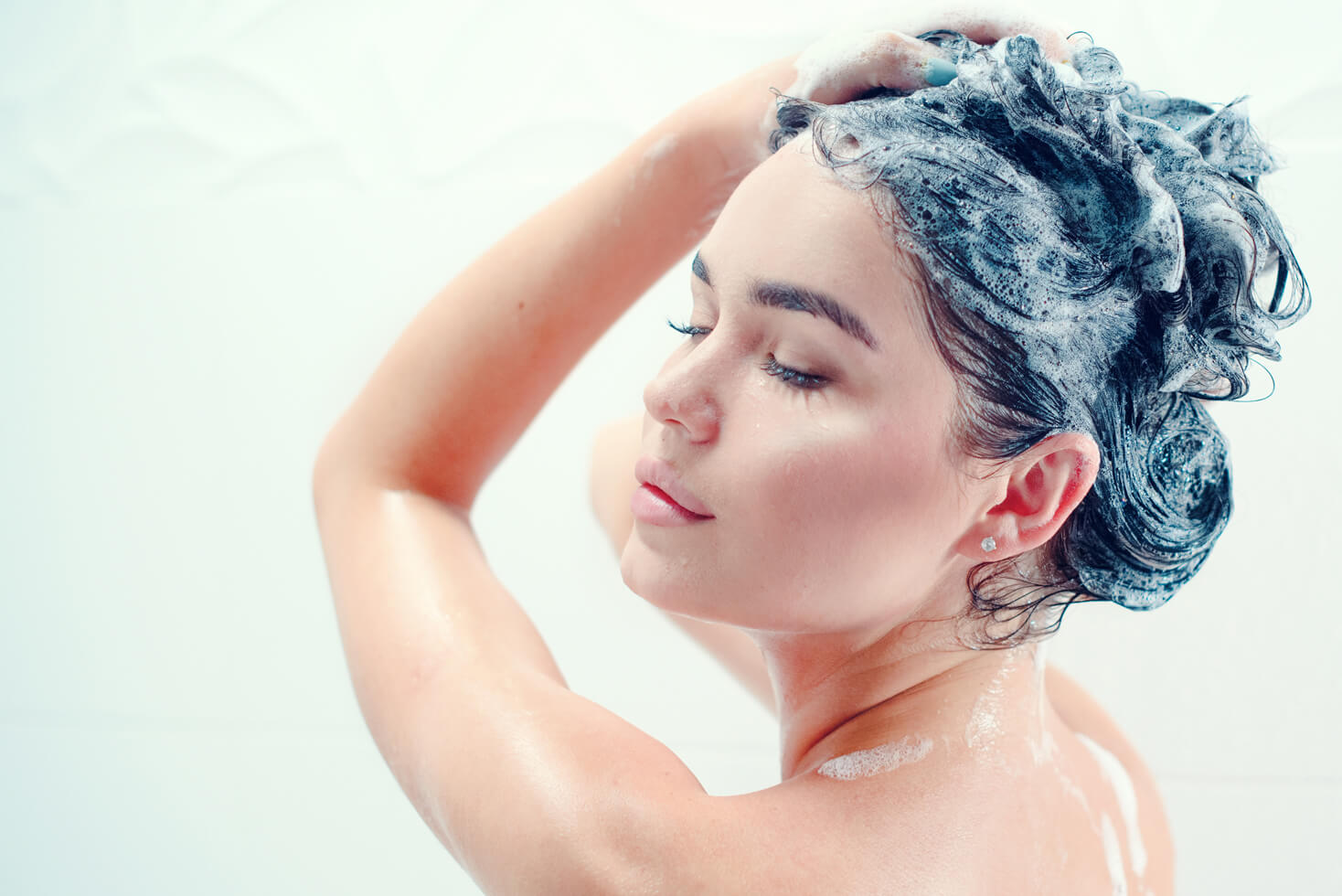How to Soften Hard Water for Washing Hair (10 Easy Ways)
Updated on
This post may contain affiliate links. As an Amazon Associate, we may earn from qualifying purchases.

If you live in a hard water area, chances are, your hair feels dry, stiff, dull, frizzy, and badly tangled almost every day.
That’s because ordinary shampoos cannot cut through hard water minerals to properly clean your hair as they would do with soft water.
So how do you soften hard water for washing your hair and get the best out of your shampoo?
I’ve been struggling with greasy hair, fading of dyes, and no matter which products I used, nothing seemed to work.
Not to mention, my hair still felt unclean with an itchy scalp and persistent dandruff.
But after realizing that I was also losing hair at an alarming rate, I decided enough was enough.
I got a water softener in my home, and it completely changed how my hair and skin feels now.
Let me show why and how you can soften hard water in your home, too, with a few solutions I have tried myself.
There are plenty of ways to make hard water soft.
The long term solution is to install a water softener or an electronic water descaler system.
1. Invest in a Hard Water Softener
The best way to soften hard water is to install a water softener, saving you more money in the long term.
Here are some good reasons why:
- It saves your appliances like washing machine from getting clogged
- Your clothes will feel fresher and cleaner from washing
- You’ll have no limescale buildup in your bathroom
- No nasty bits in the bottom of your kettle. Your tea won’t taste like dishwater
- You won’t have to vigorously brush to untangle your hair
- Your skin won’t feel dry and itchy
A water softener effectively removes calcium and magnesium from the water supply in your house, which turns it soft.
The best part about it is it reverses the effects of hard water on your hair as it gets rid of persistent issues like dandruff, eczema, and dry skin.
iSpring WGB32B 3-Stage Whole House Water Filtration System
2. Try an Electronic Water Descaler System
Unlike hard water softeners, electronic water descaler systems don’t remove the calcium and magnesium from water entirely.
Instead, they change the way these chemical elements interact with surfaces, pipes, and appliances. In other words, they act as a sort of chemical-free, anti-scale water treatment.
An electronic water descaler system turns hard water into soft water by alternating magnetic fields acting upon your main water line to change the calcium and magnesium crystals’ structure.
By altering the chemical attributes of hard water minerals, the descaler system stops hard water from causing limescale buildup.
Scalewatcher 3 Original Hard Water Electronic Descaler System
3. Get a Hard Water Shower Filter
If you’re looking for a more budget-friendly way to battle the effects of hard water on your hair, I highly recommend installing a shower filter.
You can find huge collections in home improvement stores. Their installation process is a lot less complex than those of a water softener.
A shower filter works on minimizing the minerals found in hard water as well as protecting your showerhead from limescale.
It’s incredibly effective when it comes to turning your shower’s hard water into soft water. But, it will be limited to your showerhead instead of the entire house.
T3 Hard Water Showerhead Filter
4. Try a Vitamin C Shower Filter
Like regular shower filters, Vitamin C filters are installed into your showerhead.
The filter spews powdered Vitamin C into the stream of water coming out of the head to neutralize the chlorine and minerals.
UBS Luxury Vita-fresh Shower Filter
5. Try a DIY Vinegar Rinse
Apple cider vinegar has a low pH value, which makes it an effective remedy to combat hard water’s alkalinity.
ACV is also antibacterial. It works to prevent the growth of fungus and other bacteria on your scalp.
Vinegar works to remove buildup, balancing your hair’s pH levels, and making your hair cuticles smoother. Hence it makes your hair feel incredibly soft.
While any kind of vinegar will work, I highly recommend Apple cider vinegar because it’s more potent.
All you have to do is produce a mix with a 1:2 ratio of vinegar to the water, pour it through your hair, and massage your scalp after you’re done applying the shampoo.
Leave the mix for around five minutes, then rinse it thoroughly.
However, it’s worth mentioning that you should limit this routine to only one time per week.
Otherwise, your hair could become really dry. You might want to add some coconut water to the mixture. And maybe even some lavender oil drops to give your hair the luxurious treatment it deserves.
If you try this recipe at home, let it sink for around 15 minutes before rinsing your hair.
Braggs Apple Cider Vinegar
6. Do a Citrus Rinse
Just like Vitamin C and Vinegar, citrus has low pH and hard water neutralizing properties.
Citrus and lemons are natural chelating agents that have special qualities to make hard water minerals soluble.
To prepare it, squeeze lime juice or a couple of fresh lemons and dilute them with water to turn the ratio to 1:3. If you want to add both lime juice and fresh lemons, go nuts!
After you apply your shampoo, let the mix run through your hair and make sure to get it really well to your scalp. Then, rinse and condition your hair after having it sunk for a few minutes.
You should notice your hair becoming healthier and softer after a couple of uses. And perhaps even less dandruff thanks to lemon juice’s antiseptic properties that work on fighting it.
7. Use a Clarifying Shampoo
You can get rid of the mineral buildup from hard water throughout the week by using a clarifying shampoo once per week.
While it won’t fix your hard water hair problems, it will eliminate mineral buildup and residues.
However, I’d highly recommend steering away from hair products containing sulfates. The latter can have other damaging effects on your hair or skin, so opt for a hair clarifying sulfate-free shampoo.
8. Use a Hard Water Demineralizing Shampoo
A demineralizing shampoo works to neutralize hard water minerals with special ingredients like chelators and vitamin C (Ascorbic acid).
Chelating agents and vitamin C are excellent at binding hard water minerals to nullify them. These active ingredients essentially trap hard water minerals to make them soluble to be easily rinsed off with pure water.
If you haven’t used a chelating shampoo before, I highly recommend trying the Malibu C range.
You get a whole range of hair and scalp demineralizing treatments that can restore your hair from the very first use.
9. Use Purified Water
Plenty of companies manufacture filter jugs and purified bottled water, which you can use to rinse your hair after showering with the dreaded hard water supply.
However, I’d recommend this as a last resort as bottled water isn’t exactly the most environmentally-friendly.
Of course, the issue isn’t in the water itself, but in the plastic bottles it comes in. These could take up to four hundred years to fully biodegrade!
So, if you’re looking for eco-friendly solutions, I would recommend steering away from them.
From here on, you wouldn’t be causing plastic waste with filter jugs, so they’re definitely a better alternative.
However, they’re still quite temporary and don’t work as a long-term solution to the damage that hard ward inflicts on your hair.
AQUA TRU Countertop Water Filtration Purification System
10. Save Rainwater
I know this sounds crazy, but I’m not kidding!
Rainwater is soft by nature, so many people prefer stocking up on it rather than opting for other solutions.
It’s called rain harvesting.
Yes, it takes considerable patience and effort to stock up on it. Still, it’s natural, soft, free of minerals, and completely eco-friendly!
It’s an incredible way to neutralize the effects of hard water in your hair. All you have to do is mix it with regular water with a ratio of 2:3 of rainwater to regular hard water.
You can use it for your entire shower if you’ve managed to stock up well, but if you haven’t, you could just use it for the final rinse.
Rainwater Collection System
There are plenty of ways you can soften hard water to wash your hair and skin at home.
While I’d highly recommend going with a hard water softener or an electronic water descaler, I agree it may not be a realistic option for some of you.
Why not try alternative solutions like shower filters, water purification systems, or even rain harvesting.
Trust me, after a week of washing your hair and skin with purified filtered water, you’ll notice a huge difference.
It’s totally worth it!
Scalewatcher 3 Original Hard Water Electronic Descaler System
About the Author
 Charlene Latreuille
Charlene LatreuilleCharlene Latreuille has been blogging for over 10 years and has a background in digital marketing.
Specializing in women's hair health, she blends scientific insight with practical advice, crafting easy-to-follow guides.






